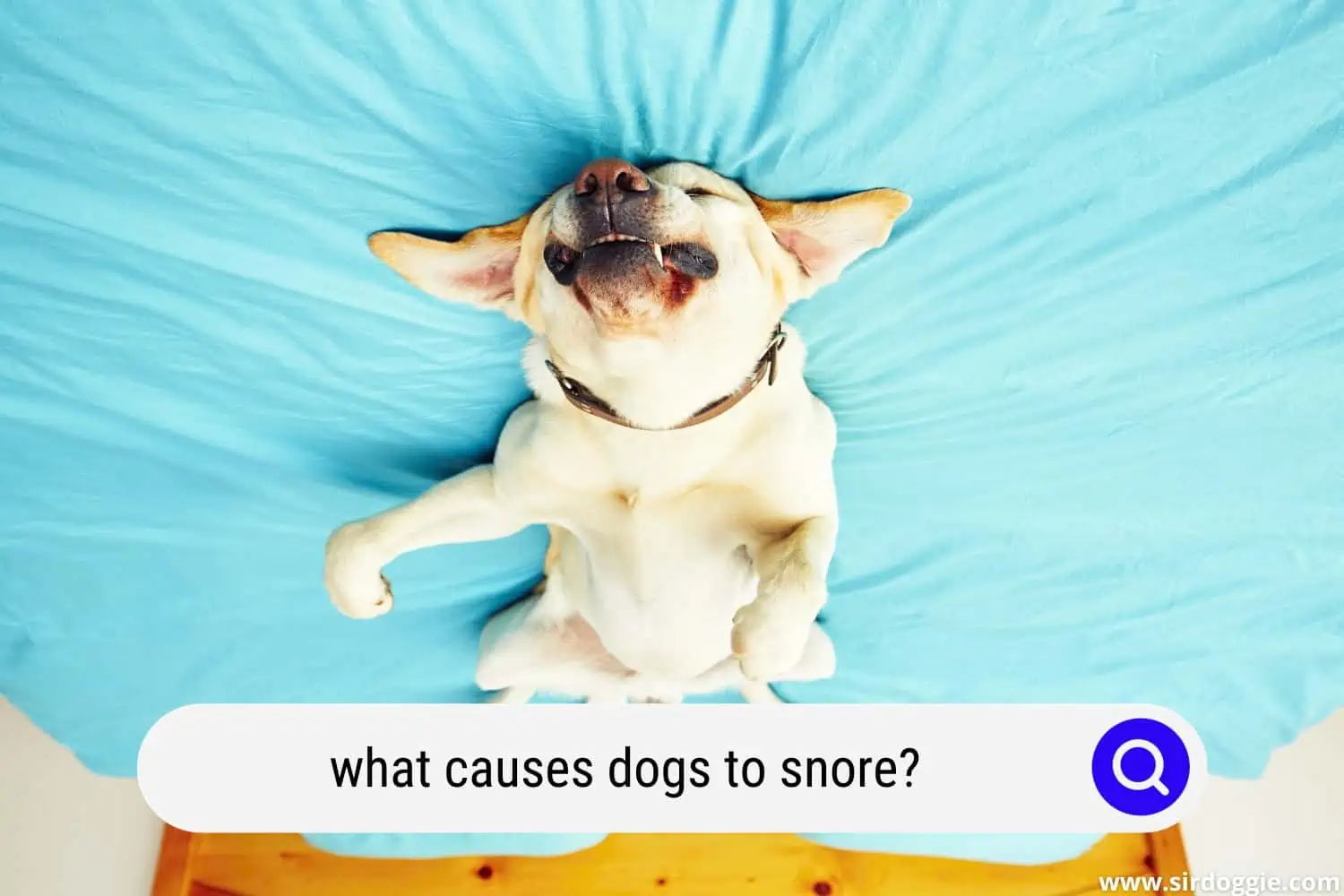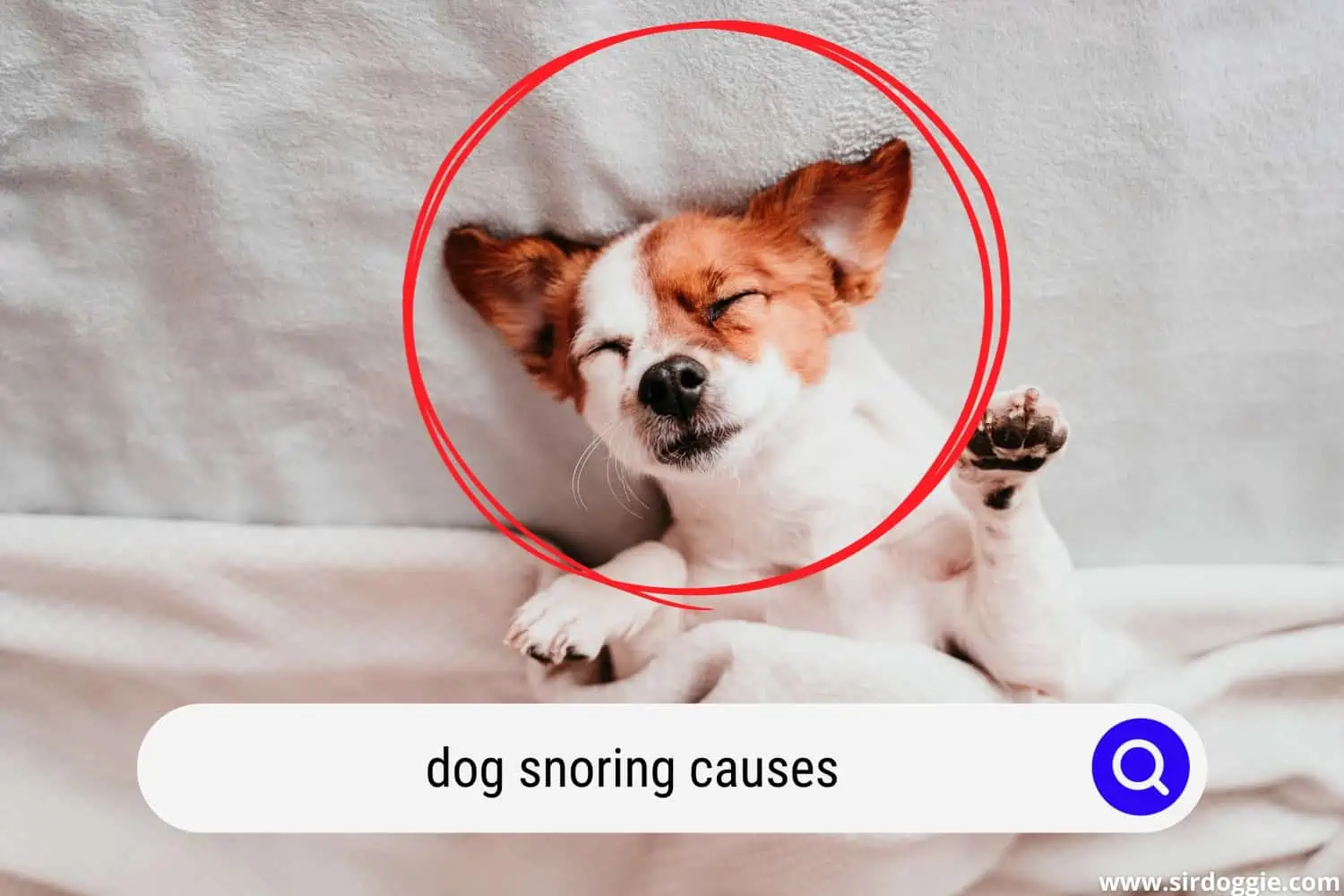What Causes Dogs To Snore? The Main Causes and Ways To Deal With It
Many pet parents, who’ve got furry bundles of joy, see a lot of positives in owning one. Who will be better suited to greet you when you come home, wagging their tails in excitement? Who will bring you slippers and jump on your lap for a kiss? Wet smooches are just precious and shouldn’t be taken for granted. However, sometimes having a four-legged means dealing with an issue that two-legged deal with: snoring. What causes dogs to snore?
There are a few valid reasons for that which we’ll cover shortly in this article. Some are not a big deal, while others may be alarming. Since dogs are mammals like people, they often have the same health issues we have, including snoring. It is the aftermath of some kind of a problem that is not properly taken care of. Let’s take a look at a few most common pooch-snoring reasons.

Related Reading: Why is My Weimaraner Snoring?
What Causes Dogs To Snore?
- Brachycephalic Syndrome: some dogs in the canine world are considered brachycephalic or short-muzzled. This condition obstructs normal oxygen flow throughout the body, causing flat-faced dogs to make various sounds like snuffling, wheezing, and snoring while sleeping. If that’s the only reason for your pup making noises at night, keeping you awake, there are no ways to change that except for nose surgery. In case you are a light sleeper, maybe it’s best to make your pooch sleep in another room on its own comfy, fluffy bed.
- Back-Sleeper Dogs: some dogs like to sleep on their backs. And, just like humans, sleeping on its rear causes a dog to snore. The reason is that a thrown-back tongue ends up partially blocking airways, intervening with regular breathing. An owner can either gently turn his/her dog on its side or on its tummy to address the snoring issue. If it doesn’t help, then a pooch has to get used to sleeping solo.
- Allergies: Pugs, for example, are prone to having allergies. Especially to pollen, dust, and certain foods. Four-legged have very similar symptoms when they are allergic as the two-legged do: fatigue, dizziness, swollen face/nose/eyes, and sneezing. When a face part swells up, it doesn’t help normal breathing. More so if an affected area is very close to the nose.
- Obesity: just like people, pets are prone to gaining extra pounds. That’s another proof four-legged are very similar to humans. Some breeds (like Pugs for instance) should be always monitored for any changes in their weight as they tend to overeat. Being obese causes people and animals to develop dyspnea or shortness of breath. That happens because fat, if accumulated near the chin and throat area, puts pressure on air pathways, preventing a normal breathing cycle.
- Nose infection: that is kinda self-explanatory. Logically, if there’s something in the nose like a lump or a swelling of some sort, it will make inhaling and exhaling very difficult. Therefore, in case you notice that your furry pal is rubbing its snout, it would be necessary to examine it. Any signs of trouble-take your precious fella to the hospital.
- Hypothyroidism: is a health condition when a thyroid doesn’t release enough metabolism-controlling hormone into the bloodstream. That causes a person/animal to get anemic, be tired, and be grouchy all the time. On top of that, an underactive thyroid triggers extreme weight gain. Therefore, it kind of goes hand-in-hand with the above-described obesity issue in pets. It may not be overeating after all, but a thyroid problem instead.
Related Reading: Do Pugs Have Breathing Problems? Reasons and Contributing Factors
Why Does My Puppy Snore So Loud and How Do I Deal With It?
So, is it normal for a dog to snore? As we’ve just covered above, it depends. Sometimes snoring is just a part of a specific breed’s “makeup,” something that is inherited from generation to generation. However, in other cases, it might be an alarming sign that needs an owner’s immediate attention. What does a pet parent have to do to stop the snoring issue? Let’s dig into it deeper if you want to wake up the next morning well-rested, not having to deal with a snuffling buddy right next to you.
- Nose Surgery: if you’ve got a brachycephalic pup like a Pug, Pekingese, or Bulldog, performing a snout surgery might be very beneficial for improving a pup’s breathing issue. A procedure that’s executed by a true vet professional can expand a mutt’s nostrils, making air pass through freely. But that cast costs a pretty penny for any pet owner if they don’t have their hound insured.
- Gently Turn Your Pup in Their Sleep: got a back-sleeper pooch? The snoring problem can be resolved by just turning it on its side or back while it sleeps. Hence releasing the tongue and fixing the abnormal airflow issue. If no other health issues are present, and your pet’s snoring still drives you crazy at night, then it will have to relocate to another room to snooze.
- Clean Your House Often: as briefly mentioned above, sometimes snoring in dogs is the result of allergies to dust or pollen. Make sure you dust your house and ventilate it regularly for the nasty mites to become history. Invest in a good duster or, even better, wet-clean your place with a rag soaked in water, wiping all the surfaces that can harbor bacteria.
- Watch Your Pet’s Diet: a very common cause of the snoring issue is obesity. In case you tend to overfeed a furry pal, it is time to stop and think in perspective. The more weight it gains, the worse the snoring will be. That’s why it is super important to invest in high-quality dog food and monitor the portions administered. Also, try to give out healthy snacks only (veggies, berries, and fruits) instead of, let’s say, oven-baked dog cookies.
- Take Your Fluffy Friend to the Vet Regularly: if all else fails, and you can’t figure out how to make your pet’s snoring stop, it is time to visit a veterinary professional. He/she will be able to determine the exact cause of the problem as well as give advice on the right treatment plan. A man’s best friend has to go to the doctor at least once a year anyway for a routine physical and shots. So an owner has to make vet appointments a habit.

Curl-Up
Having a snoring creature right next to you when you are trying to get a good night’s sleep can become a nightmare for any pet parent! Especially if you have to be alert and focused for that important am meeting. However, you have to understand: that your furry pal doesn’t keep you up at night on purpose. It just can’t help itself. This is your job as a dog owner to get to the “root of the problem,” and try to fix it. Hence creating a better situation for yourself as well as that fluffy bundle of joy you got. Just remember: if none of your attempts produce a desirable result, turn to the professionals for answers.
Related Reading: Why Do Dogs Cuddle With You?

Family Dog Expert Author
Hi there! I’m Stuart, a devoted dog lover and family dog expert with over a decade of experience working with our furry companions. My passion for dogs drives me to share my knowledge and expertise, helping families build strong, loving bonds with their four-legged friends. When I’m not writing for SirDoggie, you’ll find me hiking, playing with my beautiful dog, or studying music.